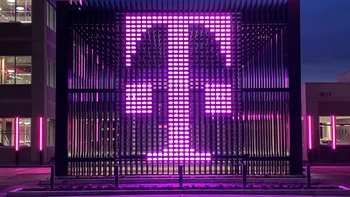Verizon proves it has a sense of humor, billing its 5G expansion efforts as 'aggressive'

Verizon's long-term ambitions of (possibly) catching up to T-Mobile in the 5G coverage field may have gotten a major boost earlier this week from the highly anticipated announcement of the big winners in the FCC's greatest spectrum auction ever, but in the short run, Big Red will need to continue to tout the controversial advantages of mmWave technology.
Of course, the 5G Ultra Wideband network itself is pretty awesome, delivering insane speeds that T-Mo's low and mid-band signals will never be able to come close to. The problem is so few of the many people subscribed to the nation's largest wireless service provider can actually obtain those download (and upload) numbers, let alone maintain a 5G UW connection for more than a few seconds indoor or even while taking a walk in the park.
For what it's worth, Verizon does seem committed to keeping up the mmWave advertising charade, characterizing its network rollout so far as "aggressive" in a press release announcing the expansion of this "transformational service" to three new cities.
Naturally, 5G Ultra Wideband access is available now merely in "parts" of Sacramento, Seattle, and Pensacola, and ominously enough, Big Red is not bothering listing any of the "parts" where eligible customers might get lucky going forward. The carrier also doesn't appear to be keeping count of the mmWave-supporting cities anymore, although the current tally is fairly easy to calculate looking back just last month.
Verizon claimed in early January it concluded last year with Ultra Wideband service available in (parts of) 61 cities, adding Colorado Springs, CO, Columbia, SC, and Knoxville, TN to the list before also spreading the love to the three aforementioned places.
Until Big Red will be able to challenge the excellent balance between 5G speeds and availability struck by Magenta on mid-band spectrum acquired from Sprint, its customers essentially have to settle for either a spotty but blazing fast mmWave signal or a "nationwide" low-band DSS network providing LTE-comparable speeds.
Unsurprisingly, said nationwide 5G service is available in Sacramento, Seattle, and Pensacola (among many other places), with no effort whatsoever required to switch from Ultra Wideband to DSS whenever the former signal might be inaccessible.
Follow us on Google News



















Things that are NOT allowed:
To help keep our community safe and free from spam, we apply temporary limits to newly created accounts: